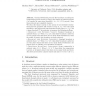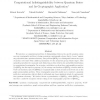64 search results - page 6 / 13 » Secure multi-party quantum computation |
EUROCRYPT
2003
Springer
14 years 18 days ago
2003
Springer
Classical distributed protocols like broadcast or multi-party computation provide security as long as the number of malicious players f is bounded by some given threshold t, i.e., ...
INDOCRYPT
2003
Springer
14 years 17 days ago
2003
Springer
We consider both information-theoretic and cryptographic settings for Multi-Party Computation (MPC), based on the underlying linear secret sharing scheme. Our goal is to study the ...
CRYPTO
2009
Springer
14 years 1 months ago
2009
Springer
We consider two-party quantum protocols starting with a transmission of some random BB84 qubits followed by classical messages. We show a general “compiler” improving the secur...
EUROCRYPT
2005
Springer
14 years 27 days ago
2005
Springer
We introduce a computational problem of distinguishing between two specific quantum states as a new cryptographic problem to design a quantum cryptographic scheme that is “secu...
CORR
1999
Springer
13 years 7 months ago
1999
Springer
Quantum key distribution is the best known application of quantum cryptography. Previously proposed proofs of security of quantum key distribution contain various technical subtle...


